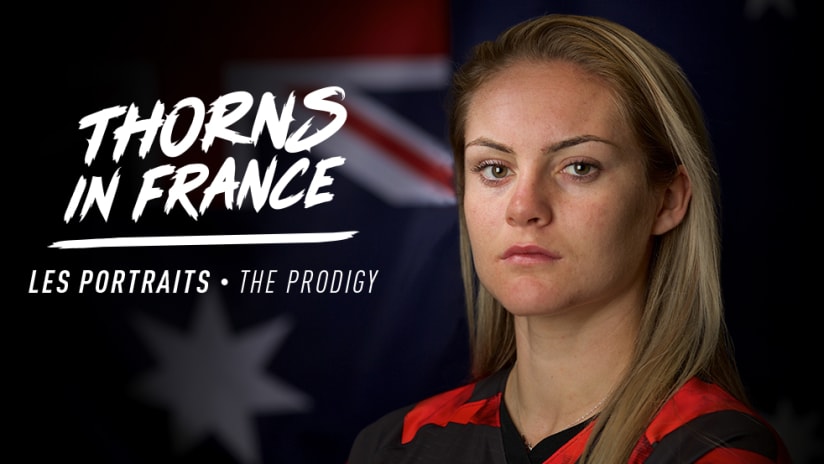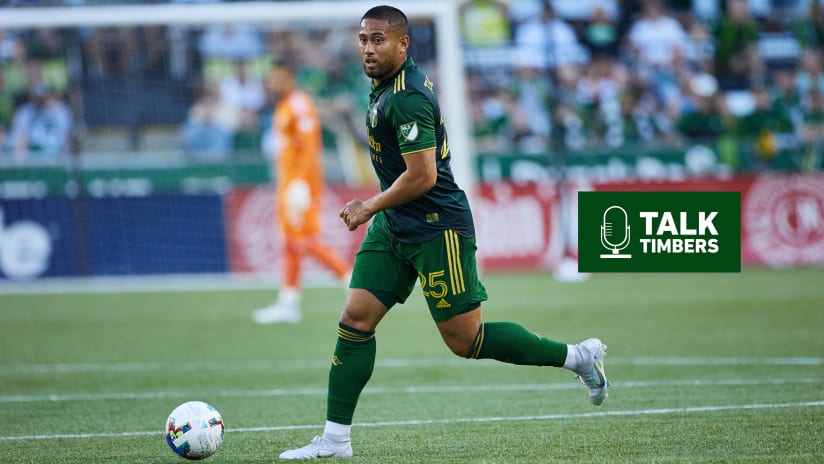PORTLAND, Ore. – There’s a long pause. With another player, you’d wonder if she was making a choice: between the best answer and the right one.
For Ellie Carpenter, though, there’s rarely a distinction. In a career which, in its early stages, has been defined by bold decisions, the 19-year-old Australian international has rarely left her path in others’ hands. What’s right and what’s best has always been in her control.
At the moment, though, we’re not talking about her decision to move to the United States last year as an 18-year-old, to join one of the best-known women’s clubs in the world, Portland Thorns FC. We’re not talking about her appearance in the 2016 Olympics as a 16-year-old, her first professional contract at 15, nor the decision to leave her rural, childhood home at 12 to pursue her dreams in soccer.
We’re talking about something far less important, yet something more central to what her new life will entail, come June. We’re talking about the last time she felt nervous.
“Probably my first cap,” she finally admits. Or maybe, it’s what she finally remembers. In her uncertainty she reveals: The feeling is not one she considers often. “I was pretty nervous when I was 15, making my debut.”
It was the season’s first game for the W-League’s Western Sydney Wanderers. Carpenter had signed with the Australian club a month before. After turning 15, and roughly three years after her, her mother, and her brother, Jeremy, left the family’s Cowra farm for Australia’s biggest city, the young Matilda was lining up across from a team featuring future U.S. international Abby Dahlkemper, someone seven years her senior. Within her own team was one of the best midfielders in the NWSL, Reign FC’s Keelin Winters, who scored the match’s first goal of the day. Western Sydney went on to draw at Adelaide United, 2-2.
The W-League has become a place where Australians can get early starts, but even by that league’s measure, Carpenter’s debut carried special significance, both for her and for the way she would be portrayed over the next four years. Getting into the national team picture, making her professional debut, and paving a path which would, less than a year later, find her playing at a major international tournament (the 2016 Summer Olympics) were all goals when the Carpenters took their plunge. But because she reached those marks so soon, Ellie’s rise has been portrayed in a context that, to her, can become misleading.
“The people that actually know me for who I am and where I've come from (know) a lot has built to this, to where I am,” she says, when asked what she sees as the most important part of her journey. “(There’ve been) lots of sacrifices.”
Carpenter is, by any reasonable standard, an athletic prodigy, but the route to where she is now wasn’t gifted from birth. It was a conscious decision, one made with knowledge that the lives of an entire family would change, and the teenage years of two children would be defined by their commitment and work.
Now, on the eve of Ellie’s first World Cup, the commitment the Carpenters made over the last seven years is getting an ultimate reward. And at some point, the soccer world may stop seeing Ellie as a prospect and take a pause to reflect on what she’s already become.
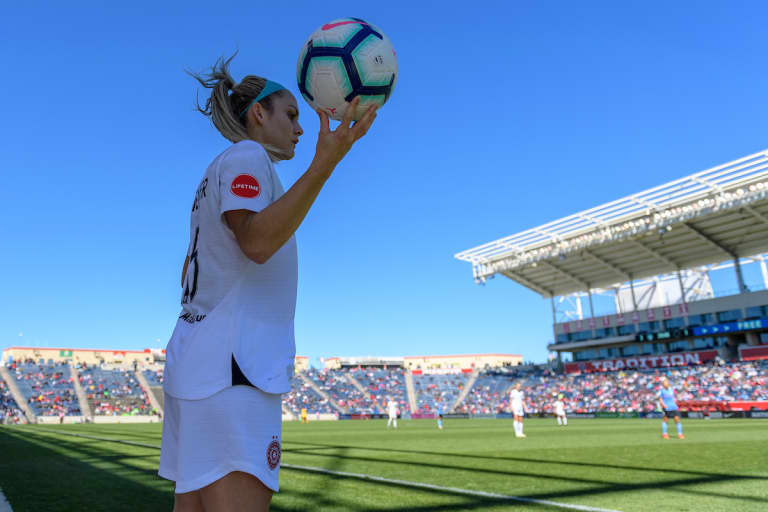
Image: ISI Photo
“I feel I'm experienced for my age,” she admits, “but I obviously have a lot of experience to go.”
This is how we got to the topic of nerves. In the referee’s dressing room of Providence Park – a space that’s been made into a makeshift studio for Thorns FC’s media day – we’ve been bouncing between topics for 15 minutes. Both sides of Carpenter have come out. There is a side that’s starkly 18 years old (it’s a month before her birthday), one that greets each new experience with an excitement that threatens her composure. But then there’s that composure: something she’s trained herself to have; something that’s developed into a skill, one that’s been required of her as she’s claimed a regular spot with a World Cup contender.
She wields a moment later. We’re still talking about nerves. She’s just confessed she hasn’t felt nervous in almost four years. I mistakenly lead her in the wrong direction, saying “you've probably forgotten what it feels like.”
“Yeah, I have forgotten but …,” she says, before rebalancing her best and right options. “No, actually I do remember. I was very nervous before [the first Western Sydney] game, but once I got on there it was fine. Not nervous anymore.”
The coda comes with her eyebrows raised, as if hitting the button on script that will analyze her data. Now, she’s looking at the output. It is right? Is it wrong? They’re the wrong questions, it seems. Her being nervous just. … is. Or was. The data means a certain thing, benign, just as Carpenter’s first game for Western Sydney produces something objective, almost inert. What was supposed to be was, and it forever shall be. “Interesting,” she seems to say to herself.
We backtracked four years because those four years have been too much. Olympic games. Asian championships. A move to the United States. Add in a crucial 2017 Tournament of Nations that saw Australia take a title on U.S. soil – including an historic, 1-0 victory over the USWNT that’s become, for the Matildas, a watershed moment – and Carpenter’s already lived more of a soccer career than most.
In terms of her ascent, the match against the U.S. stands out.
“That was my first important start for the team,” she remembers, of the July 27, 2017, match at Seattle’s CenturyLink Field. A 67th-minute goal from midfielder Tameka Butt gave the Matildas their first victory ever over the world’s top squad. Carpenter started across from Megan Rapinoe.
In Australia, her matchup against Brazilian icon Marta at the 2016 Olympics has stayed in focus, perhaps because the Matildas’ victory over the U.S. became the dominant storyline from Seattle. Carpenter’s highlighted that matchup, too. But there’s something about beating the U.S., especially on home soil. And for an international-level fullback, there may be no tougher matchup than trying to contain Megan Rapinoe.
“That game gave me a lot of confidence,” she admits, now. “(I’ve been) starting regularly since that game, which has helped me a lot, and I've improved as a player. That was definitely a turning point in my career, that game.”
It may be why, when talking about this month’s World Cup, Carpenter has trouble forecasting nerves. Her first professional game, the Olympics, matchups against the world’s Megan Rapinoes, and a regular role at last year’s Asian Cup. These things have all happened since her debut in Adelaide, as has her first year with the Thorns, which ended with her playing in front of near-20,000 people in an NWSL final. At this point, Carpenter’s earned the right to see the typical pre-match anxiety as, for her, a little dated.
“I get the question a lot if I'm nervous for the World Cup,” she says, “and I wouldn't say nervous. I'd always say excited. Because I've been to so many major tournaments, and I'm definitely not nervous. I'm just so excited for it.”
It’s not the answer we’d expect. But for Carpenter, it’s the best one, as well as the right one.
“Nothing's going to [be different] to any tournament that I've been to before. It's just the same soccer field and the same girls I’ve been playing with for four years.”
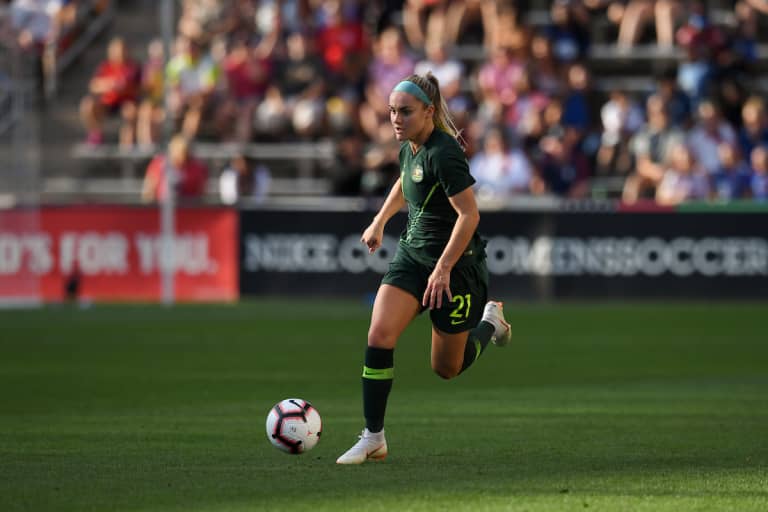
Image: ISI Photo
Other players get asked these questions, too. But those queries don’t define their story the way they define Carpenter’s. If you’re 30 years old and making an initial World Cup that maybe your last, you get asked about nerves, but you’re as likely to be asked how excited you are, or what your breakthrough means to you. Carpenter gets those variations, too, be even from her club team’s in-house writer – even in an interview where, three months out from France, the idea of nerves is more hypothetical than practical – Carpenter has to deal with a subtext that’s ever-present: aren’t you just 19?
In most of her answers, there are reminders: she hasn’t just broken into her national team; this is her life, not something she’s been gifted; and just like teammates that are in their 20s and 30s, she’s spent a whole cycle preparing for the World Cup.
“It's been three, four years coming,” she says, about France 2019, “and we've been preparing in our cycle for the national team. We're all building for this moment at the World Cup. We've all spoken about it and what we want to achieve there, and it's been a good journey so far. And three months out, it's just really exciting.”
Carpenter can speak like this not only because she’s been around for a full cycle, or has now expanded her career to a new league on a new continent. The era in which she’s coming into her own coincides with the first major phase of significance for the Matildas.
For more than a decade, now, Australia has had a team that’s capable of making, or winning a game in, a major tournament’s knockout round. They did so at Canada 2015. But with the emergence of one of the world’s best players, Sam Kerr, and the 2017 defeat of the United States, the Matildas have captured their home country’s imagination. Australia’s women’s soccer team are among the country’s most popular squads, with their federation pushing to bring the next Women’s World Cup to Australian soil.
“When I came into the team we weren't as publicly known,” Carpenter reminds, “and now three, four years later, we're walking down the street and they know that we're Matildas.
“That’s awesome. The movement that we're making in Australia, not only for women's football but women's sport, and especially us going for the 2023 bid, will be so great for our country if we could hold that. And the exposure and those people it would draw to Australia, and it would just help the country and football and women in sport.”
“For me it’ll be amazing,” she says, about the prospect of an Australia 2023. “I'll be 23, so it'll be peak, the World Cup. I'm hoping, crossing my fingers we can host that.”
Imagining what Australia will be in 2023 should strike fear into every other soccer federation. Already, the Matildas are considered one of the most capable sides in the world. When experts are asked who can offset the Americans’ talent and France’s home field at this World Cup, a second breath is never needed before they get to Australia’s chances. If the Matildas lift the trophy in early July, it will be exciting, it will be historic, but it won’t be surprising. Nobody in the game would be shocked if Australia won.
But in 2023? Kerr will be 29. Caitlin Foord will be 28. So will defensive stalwart Alanna Kennedy. Emily Van Egmond (29), Chloe Logarzo (29), Steph Catley (29) and Hayley Raso (28) will still be short of 30 years old, and Carpenter? She’ll barely be 23 years old. Regardless of where 2023 is played, Australia has to be considered that tournament’s favorite, as of now.
Ah, but there it is, again. Her age. It truly is unavoidable, mostly because it’s the truth. It’s right. But at some point, that truth can’t be the best story to tell about Carpenter, especially when it’s used to imply that’s a difference between Carpenter and her peers – like she exists in one world, while they rest in a most established, mature one. It’s been long enough, now, for the prodigy to become something else. She can be both a young Matilda and … just a Matilda.
“When I first came in they were quite older than me,” she says, when asked about the age gap between her and the Kerrs and the Foords. “But now they're some of my best friends.
“It's great to have role models like Sam and Caitlin. They both came into the team young like me. And just to see where they are now and to be a teammate of them, it's a privilege.”
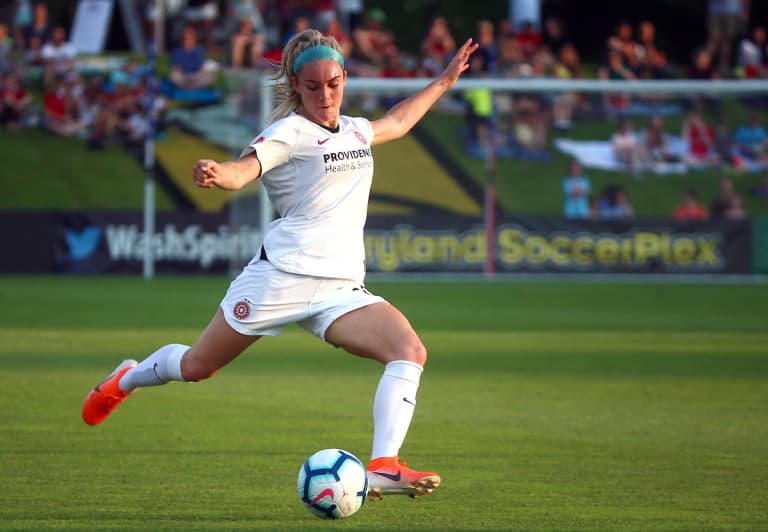
Image: ISI Photo
Come 23, Carpenter won’t be a prodigy anymore. And given how she can already speak about talents like Kerr and Foord, it’s worth considering whether she should still be considered a prodigy now.
The term comes with a level of respect few players will ever be afforded, recognizing a level of talent that feels preternatural. But that feeling also obscures much of Carpenter’s arc, implying that where she’s climbed is the result of gifts, or good fortune. With the tag prodigy – or prospect, or just terms like young talent, or star – we’re often left consumed by our own naiveté instead of focusing on the player’s now.
It doesn’t have to be this way. There can be spaces to talk about Carpenter’s journey that exist independent of her age, her path, or her choices. There are places for those topics, too. But in too many evaluations, too many profiles, Carpenter’s youth can be separated from what she is now. When she steps on the field, though, it doesn’t matter if she’s 19 years old.
“There’s not an attacking fullback like Ellie Carpenter in this World Cup,” Thorns head coach Mark Parsons said, a week before the World Cup. “There isn’t.”
No reference to age. No allusion to prodigies, or her future.
“If we see her firing, on all cylinders, we’re going to be humbled by how the world reacts to her,” he said. “We see it all the time, and we take it for granted.”
If France 2019 plays out like Parsons hints, we won’t be taking Carpenter for granted any longer. We won’t continue making her rise into a soccer homily, passing over the struggles that came with a family’s worth of tough choices. We won’t continue forgetting about the day-to-day work that went into charting Carpenter’s year-to-year, tournament-to-tournament course. If Carpenter becomes one of the World Cup’s breakout stars, we’ll be forced to acknowledge her now.
We’ll be forced to pause, as Carpenter does when recalling her nerves, and consider our choices, between which stories are the best ones and which stories are the right ones. To date, we’ve told the best Carpenter stories – the inspirational ones that have taken her from Cowra to Portland, and now, beyond – but in France’s showcase over the next five-to-six weeks, we may get a platform to tell the right ones. Carpenter is no longer merely a prodigy. She can stand eye-to-eye with any fullback in the world.

